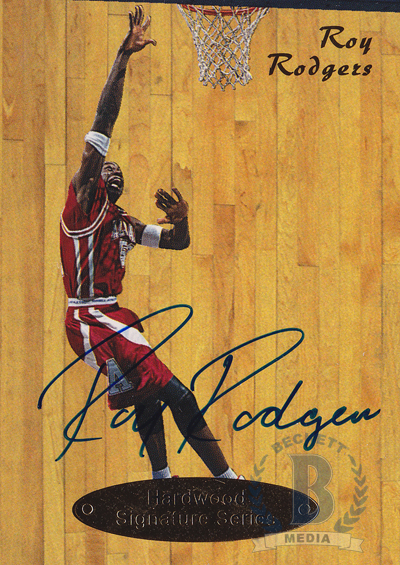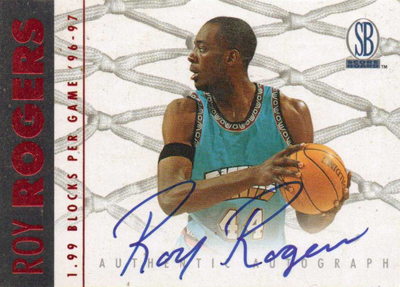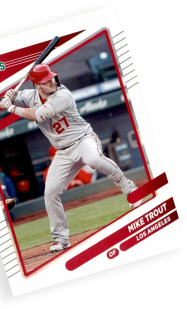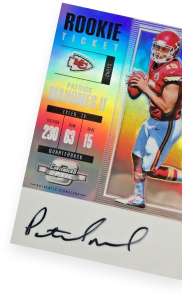This Roy Rodgers card remains my favorite mystery

By Chris Olds | Beckett Basketball Editor | Commentary
A year or so before I attended the University of Alabama, there was one Crimson Tide card in my collection that stood out from the others because it was, well, a little bit different.
It’s a 1997 Genuine Article Autographs card of Roy Rodgers, who went on to a decent rookie season with the Vancouver Grizzlies before four rather forgettable seasons in the NBA that signaled just one thing — the quick end of a career.
But that’s not why this card remains a favorite card in my collection — it’s because the $1 card packs a bit of a mystery. Not sure what it is? Compare it to another of his cards … after the jump.

Do you see a difference in the signatures? If not, look letter by letter … Rodgers’ name is actually Roy Rogers — though he apparently signed his name with an added letter for the Genuine Article card … right?
Genuine Article was a company that arrived in 1997 with an autograph in every pack as part of the draft picks card wave of the late 1990s that put more emphasis on autographs. It produced cards in basketball and football before quickly vanishing. What were the business-side stories, the gossip, back then? I don’t know — all I know is that my card was “signed by Roy Rodgers in the presence of a representative of The Genuine Article Inc” and that “The signature is guaranteed authentic unconditionally” by Andrew Havens, the company’s president.
It says so on the back of my card, which is, by the way, hand-numbered 2,454 out of 7,500.
Ironically, the “Rodgers” signature compares very favorably to any of the other “Rogers” sigs on the market. (Most of them actually look more like the “Rodgers” without the “d” than the “Rogers” one seen here from Score Board.) Maybe the former Alabama star signed all of the Genuine Article cards that way as a joke — there is a distinct pause on that letter on other signed copies — or maybe someone signed them for him. (Want to see an example of this? Go do some research on the 1994 Signature Rookies Autographs card of Errict Rhett. Things can happen.)
Or, maybe something else took place here.
We’ll probably never know.
I’ve met Rogers and got an autograph — there was no “d” for the record — years ago at an Alabama basketball fund-raising event, but I wasn’t able to ask about the card. (I should have brought it to the event to show and ask.) Because of that, it remains one of my favorite unsolved mysteries on cardboard.
If there’s one thing that collectors on the Internet love, it’s a conspiracy. Is there one here? Who knows … anyone else notice any Genuine Article anomalies through the years?
—
—
However, there is a lesson or two to be learned with this card — whether it’s legit or not.
First, mistakes can happen and we see those all the time. That’s a possibility.
Second, fakes can happen — though we shouldn’t have to worry about certified signatures as league licenses should prevent fakes from knowingly being distributed. Then again, there was no league license with Genuine Article. (In theory, leagues should frown upon these types of errors — and punish for them by revoking licenses or adjusting deals. Has it happened? Who knows … that’s probably another story.)
Third, trust the company whose products you are buying — or at least its history. If you’re weary of a company or think their practices could be in doubt, then try something else.
Fourth, a guarantee — a certificate of authenticity — is only good if it can be backed with a name, a face or a company to support it. If Company X is here today and gone tomorrow, then the guarantee is no good, whether it’s on a card or a piece of memorabilia. A company that’s here today can’t fix a mistake tomorrow if they are no longer around.
Chris Olds is the editor of Beckett Baseball magazine. Have a comment, question or idea? Send an email to him at colds@beckett.com. Follow him on Twitter by clicking here.







I love this story. I’m from the Vancouver area and Roy Rogers lived 5 houses down the road from me when he played for the Grizzlies. I never thought I’d see a story related to this guy.
All these stories about companies putting fake autos in their products has got me scared to even buy anymore cards. I wish this hobby would clean itself up and stop being so wishy washy. If it comes out that this happens on a consistant basis with valid proof other than heresay, I don’t know if this hobby or the companies making the cards could take that kind of hit and stay in business. Not to mention how hard it would be for any new company to get the trust of collectors back. I would hate to think that I have spent thousands of dollars on boxes and packs just to get a bunch of fake autos and memorabilia. My hope for this hobbies future is getting to be hopeless. I mean this is the second story like this in a week.
Investigative journalism, I like just the hint of it. Collectors are skeptical of the authenticity of game used memorabilia, from both stars and pine riders. It’s not a stretch to believe that card companies would put out bogus autographs. I would like to believe that the autos. and GU are on the level but the card companies seem to do very little to reassure collectors when doubts arise. I want Beckett to stay on top of potential fraudulent actions by the card companies.
This one thing I like about topps, don’t they claim to witness every signature? Topps has obviously had their share of mess ups, but at least they are trying to witness all signatures.
They must send out a lot of representatives to do this, or do i have it wrong?
I am not saying that its a stretch or that I want to walk around not knowing of the possibiltiy of stuff being fake. I know Beckett is NOT trying to ruin the hobby by saying certain things, they want consumers to be aware. If it came across that way, thats not how it was meant. I would and do always put most of the blame on the card companies and agree that they should do more to put us as collectors at ease over the situation. I just wish they would start to make things right. And hope its not as bad as some people are suggesting it could be.
Darin, Topps has a rep at every signing. Examine other companies’ authenticity statements and you will see that some merely state that the autographs come from the person — i.e. are sent to them and then sent back.
Nick, it’s one thing to say it if there’s definitely proof. In this instance, there’s plenty to make you think it’s fake but the only person that could tell me that — or whether he signed it — is Roy Rogers. You should always be aware of what you’re buying — and be skeptical if necessary no matter what the source to make sure that YOU are comfortable with what you buy.
Randall, it’s one thing to think it — but to write it and remain credible one must prove it. You’ll note that nowhere in this item do I say that it’s a flat-out fake, though common sense would indicate that might be the case here with the Rogers card. There have been instances recently where some companies’ autos have looked iffy or odd, but they were legit. Making claims is easy — proving them is another thing.
Nick (again), there’s plenty of hearsay out there. And you’ll note that when one item gets dwelled upon and becomes an Internet storm it doesn’t always necessarily end up being written about here — because there’s no proof in most instances.
Chris, I didn’t mean to suggest that you said the auto. was a fake. It is a starting point for a conversation about the authenticity of autos and memorabilia in general. Beckett is not in the business of muckraking nor are is it the National Enquirer. Libelous statements are bad for business. Just keep us collectors informed so we can decide.
If there’s a story out there about a major manufacturer duping the public with intent to deceive with fake autos and it can be proven? I’m all over it.
However, it’s *never* that simple.
Chris, thank you for the comments. So then I am going to ask you this… In your opinion, do you think the hobby is in danger right now with the possibility that there are a lot more bogus gu and autos than what people really think there might be? With that being said I want to say that I know that being somewhat skeptical about this topic is normal considering that we are taking someone else’s word that they are real and the only way to know for sure is to witness it yourself. But then you have to take into consideration that if your skeptical of the few people who produce “most” of the cards today, what would be the point in buying them then even if you want to keep collecting, but want to collect legitimate cards for your money. I mean isn’t some of the reason they come to the price points that they do for packs, boxes, and cases is because they are paying these players for their autos? Why would the company themselfs not want to make sure they are getting what they are paying for?
In1997, Beckett basketball reported this and with an article. I thought it said it was a fake.
Yeah, I recall the item. I don’t recall specifics — whether it said that or not — but this is not a new example of a weird card. It’s just one I was reminded of the other day when going through some stuff.
Nick: Generally, I don’t think there are that many problems with certified autos. But clearly things can always happen — whether a company knows about it or not. I say stick with companies you trust and always compare a sig you are buying with other certifieds.
I remember this card being in a Beckett Basketball issue in the late 90’s when it was discovered. It made me question and examine a lot of autos I had at the time. I refused to buy anymore Genuine Article autographs after that. Also, I wish I could find a picture of one but I remember buying a bunch of packs of 2000 Press pass Rage which had extreme sports. I pulled a Cory Nastazio autograph or “”Corey Nastazio” as Press Pass had it on the card. He very clearly had signed “Corey” on the autograph and his name is really spelled without the “E”. I lost faith in Press Pass after that. I wish someone had the card to post a pic of it as I sold it in a huge lot of the Rage Autographs many years ago.
Whoever really signed this card was obviously looking at the spelling on the card in the top right corner of the picture. It is misspelled (Rodgers) also.
I read somewhere that when he got them to sign he noticed they were spelled wrong and just laughed it off and went with it. He got his money so he fulfilled his contracted duties.